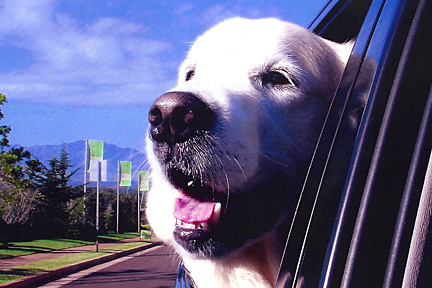
Rocky Pooh Ninomiya, a Golden Retriever, catches a breeze in the family van.
Help your pets beat
September’s heat
September is one of Hawaii's hottest months, and temperatures can regularly reach 90 degrees. While humans can head for the shave ice stand or perspire to regulate body temperature, pets rely on their owners to help them beat the heat.
Keep pets coolSigns of heatstrokeHeavy panting, glazed eyes, a rapid pulse, unsteadiness, a staggering gait, vomiting or a deep red or purple tongue. What To Do » Lower body temperature immediately: Move your pet into the shade and apply cool (not cold) water all over her body. » Apply ice packs or cool towels to your pet's head, neck and chest only. » Give your pet small amounts of cool water or ice cubes to lick. » With rabbits, moistened their ears with cool water but refrain from submerging their bodies with water. » Take your pet directly to a veterinarian; heatstroke can be life-threatening.
|
Heatstroke can be deadly, so here are some tips to follow:
Don't leave any animal in a parked car. Leaving windows slightly open will not prevent overheating. A California research study found in July that the temperature inside a car rises surprisingly fast: 19 degrees in the first 10 minutes; 34 degrees within half an hour.
Hawaii's tradewinds and passing clouds can be deceiving. "What matters is whether it's sunny out," said Stanford University researcher Dr. James Quinn, an associate professor of emergency medicine. "Much like the sun can warm a greenhouse in winter, it can also warm a parked car on cool days. In both cases the sun heats up a mass of air trapped under glass."
Surface temperatures of the dashboard, steering wheel and seats can be as high as 160 degrees. These objects give off radiant energy, heating the interior air, which cannot escape. Cracking the windows or running the air conditioning before turning off the engine does not keep the car any cooler.
If you see an animal in a car exhibiting any signs of heatstroke, call 911 immediately.
Leaving pets in cars also exposes them to theft. If you must take your pet with you in your car, do so safely. Cats should ride in pet carriers, and dogs should ride in travel crates or be on a leash.
Keep it cool indoors. Indoor pets need a well-ventilated environment. Pet owners who close the windows in the morning on their way to work might consider what their house temperature is at midday, especially for apartment dwellers. An air-conditioned room is a welcome relief to the animals.
Make shade outside. Pets kept outdoors should have a shady rest area and a well-ventilated, shaded doghouse.
Exercise when it's cool. Walks and runs in the early morning or evening are ideal. Dogs taken to the beach or park for the day should be provided a shady spot with access to plenty of water.
Water is always cooling. During hot months, pets are prone to dehydration. Fresh and accessible drinking water is essential. Consider adding a child-size swimming pool to the yard where your pet can soak during the heat of the day.
Give long-haired pets a trim, including rabbits. A visit to the groomers can help to keep your pet cool.
About rabbits. Place your rabbit's home in the coolest, breeziest part of the house. For rabbits in hutches outdoors, owners should take note of where the sun travels throughout the day to ensure that the rabbit's home is always shaded.
Rabbits dissipate heat through their ears, so misting them will help keep them cool. Try placing a ceramic tile in a place your rabbit likes to sit. Some rabbits enjoy snuggling next to a plastic soda bottle filled with frozen water.
About birds. Most birds enjoy a mist bath or like to play in a shallow dish of water. Owners can indulge their birds daily, but make sure not to soak their feathers.
E-mail to Features Desk
[News] [Business] [Features] [Sports] [Editorial] [Do It Electric!]
[Classified Ads] [Search] [Subscribe] [Info] [Letter to Editor]
[Feedback]
